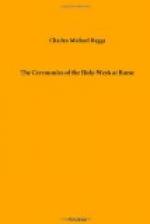[Sidenote: Divine office, its origin.]
“Gregory VII did but restore and harmonise these offices; which seem to have existed more or less the same in constituent parts, though not in order and system, from Apostolic times. In their present shape they are appointed for seven distinct seasons in the twenty four hours, and consist of prayers, praises and thanksgivings of various forms; and, as regards both contents and hours, are the continuation of a system of worship observed by the Apostles and their converts. As to contents, the Breviary service consists of the Psalms; of Hymns and Canticles; of Lessons and Texts from inspired and Ecclesiastical authors; of Antiphons, Verses and Responses, and Sentences; and of Collects. And analogous to this seems to have been the usage of the Corinthian Christians, whom St. Paul blames for refusing to agree in some common order of worship, when they came together, every one of them having a Psalm, or a doctrine, a tongue, a revelation, an interpretation (1 Cor. XIV, 26). On the other hand, the catholic seasons of devotion are certainly derived from apostolic usage. The Jewish observance of the third, sixth and ninth hours for prayer, was continued by the inspired founders of the Christian church. What Daniel had practised, even when the decree was signed forbidding it, “kneeling on his knees three times a day, and praying and giving thanks unto his God”, S. Peter and the other Apostles were solicitous in preserving. It was when “they were all with one accord in one place”, at “the third hour of the day”, that the Holy Ghost came down upon them at Pentecost. It was at the sixth hour, that St. Peter “went up upon the house-top to pray” and saw the vision revealing to him the admission of the gentiles into church. And it was at the ninth hour that “Peter and John went up together into the temple”, being “the hour of prayer”. But though these were the more remarkable seasons of devotion, there certainly were others besides them in the first age of the church. After our Saviour’s departure, the Apostles, we are informed, “all continued with one accord in prayer and supplication, with the women, and Mary the mother of Jesus, and with His brethren”: and with this accords the repealed exhortation to pray together without ceasing, which occurs in St. Paul’s epistles. It will be observed that he insists in one passage on prayer to the abridgment of sleep (Eph. VI, 18); and one recorded passage of his life exemplifies his precept: “And at midnight Paul and Silas prayed, and sang praises unto God, and the prisoners heard them”.
In subsequent times the Hours of prayer were gradually developed from the three, or (with midnight) the four seasons above enumerated, to seven, viz. by the addition of Prime (the first hour), Vespers (the evening), and Compline (bedtime); according to the words of the Psalm, “Seven times a day do I praise Thee, because of Thy righteous judgment. Other pious and instructive reasons existed, or have since been perceived for this number".[46] Thus far our Protestant author, with whose remarks we are too well pleased to go out of our way to dispute with him the truth of some other portions of his tract, which are objectionable.




